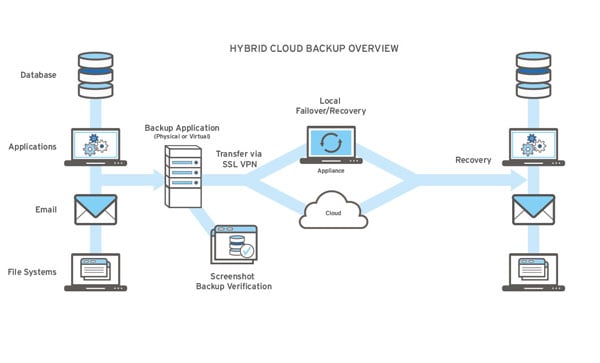How SMBs benefit with hybrid cloud
Today's businesses require a backup solution that delivers much more than a traditional local only strategy.

Today’s businesses require a backup solution that delivers much more than a traditional local only strategy. Given the constant risks to its data, from all directions, it’s important for businesses to ensure
- that their data is protected
- they can remain operational in lieu of a system disruption. That’s where a hybrid cloud-based backup solution comes in.
According to analyst firm ESG hybrid architectures are the top desired features by today’s businesses.* With good reason. This paper identifies four key reasons why a backup, recovery and business continuity solution based on a hybrid cloud model is preferred.
Security
With a hybrid solution, a company’s essential data is backed up locally and then an additional backup is replicated off-site, providing additional data security; data insurance if you will. The in-house data is protected by redundant sets of information with the local device being the first line of defense. In most cases, three distinct copies of each file exist – on the workstation or server, on the local device and in the public cloud. In addition, encrypted files are stored off-site are available in case an unforeseen event, like a natural disaster, occurs. This should give businesses the peace of mind to know that their data is always accessible no matter what the circumstances. It is just as important to insure data as it is to insure physical resources, like buildings, employees and other assets. After all, client data is a business’ most important asset, and ensuring business continuity in the form of hybrid cloud storage is an intelligent and logical step toward protecting that asset.
Storage
With a hybrid solution, a company’s essential data is backed up locally and then an additional backup is replicated off-site, providing additional data security; data insurance if you will. The in-house data is protected by redundant sets of information with the local device being the first line of defense. In most cases, three distinct copies of each file exist – on the workstation or server, on the local device and in the public cloud. In addition, encrypted files are stored off-site are available in case an unforeseen event, like a natural disaster, occurs. This should give businesses the peace of mind to know that their data is always accessible no matter what the circumstances. It is just as important to insure data as it is to insure physical resources, like buildings, employees and other assets. After all, client data is a business’ most important asset, and ensuring business continuity in the form of hybrid cloud storage is an intelligent and logical step toward protecting that asset.
Savings
One of the biggest concerns for SMBs when making any sort of technology decision is the bottom line. Fortunately, hybrid cloud backup solutions are cost effective. The hybrid model keeps costs low. Because companies only need to purchase a local unit while the rest of the infrastructure lies in the cloud. The cost to businesses is a simple monthly fee that covers the cost of leveraging the cloud and all of the services outlined in the SLA. It’s important for businesses to look for a solutions provider that can offer fixed cloud pricing.
Virtualisation
In the event of a disaster, be it natural or technical, businesses must be confident that their data was backed up, and that it can be restored in a timely manner. When SMBs experience downtime, they stand to lose a great deal of money as IT strives to bring operations back online. In these instances, virtual machines (VM) on the cloud can be the difference between downtime and uptime. Cloud VMs are copies of workstations or servers running on a server in the cloud. Every aspect of the duplicated machine can be run from this virtual machine that lives in the cloud, and is therefore not vulnerable to localised phenomena, like a weather disaster. Companies can failover to the cloud to avoid downtime, keeping data and operations running smoothly and consistently, ensuring business continuity even when the winds are strong and the weather fierce. Hybrid cloud backup solutions offer businesses the best of both worlds, and play an essential part of a comprehensive backup, recovery and business continuity strategy. The added benefits of Security, Storage, Savings and Virtualisation should make the transition to a hybrid cloud solution a little easier, and hopefully alleviate any fears of the cloud.
Featured services & solutions
Small business solutions
Return to doing what you love; we’ll take over the bulk of your records management process
Iron Cloud data management
Strategic cloud data management and secure data storage with a trusted partner
Jumpstart your Digital Transformation
Go digital with Iron Mountain. Learn about Iron Mountain’s digital transformation services and how they can optimise and transform your business’s information and data.
Related resources
View More Resources
Elevate the power of your work with Iron Mountain

Expert roundtable: Iron Mountain's workplace evolution journey
